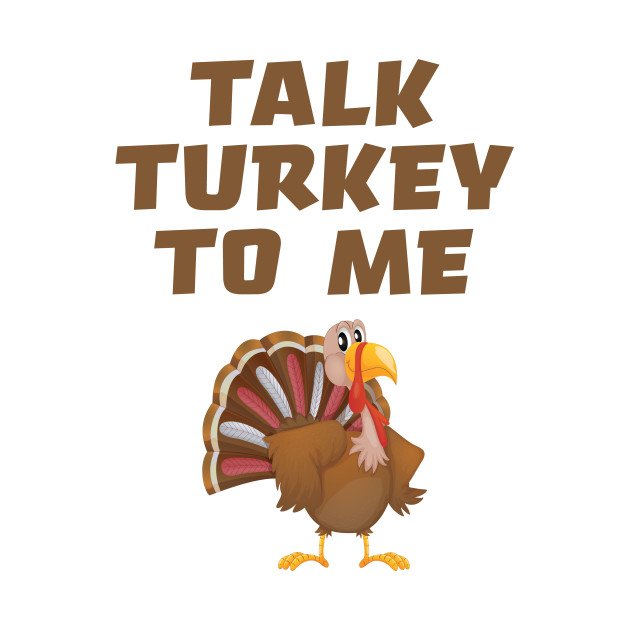
noun, plural tur·keys, (especially collectively) tur·key.
- a large, gallinaceous bird of the family Meleagrididae, especially Meleagris gallopavo, of America, that typically has green, reddish-brown, and yellowish-brown plumage of a metallic luster and that is domesticated in most parts of the world.
- the flesh of this bird, used as food.
- ocellated turkey.
- Slang.
- a person or thing of little appeal; dud; loser.
- a naive, stupid, or inept person.
- a poor and unsuccessful theatrical production; flop.
- Bowling. three strikes in succession.
Idioms
- talk turkey, Informal. to talk frankly; mean business.
noun plural -keys or -key
- a large gallinaceous bird, Meleagris gallopavo, of North America, having a bare wattled head and neck and a brownish iridescent plumage. The male is brighter and has a fan-shaped tail. A domestic variety is widely bred for its flesh
- the flesh of the turkey used as food
- a similar and related bird, Agriocharis ocellata (ocellated turkey), of Central and N South America
- any of various Australian birds considered to resemble the turkey, such as the bush turkey
- slang, mainly US and Canadian
- a dramatic production that fails; flop
- a thing or person that fails; dud
- slang, mainly US and Canadian a stupid, incompetent, or unappealing person
- slang (in tenpin bowling) three strikes in a row
- See cold turkey
- talk turkey informal, mainly US and Canadian to discuss frankly and practically
noun
- a republic in W Asia and SE Europe, between the Black Sea, the Mediterranean, and the Aegean: the centre of the Ottoman Empire; became a republic in 1923. The major Asian part, consisting mainly of an arid plateau, is separated from European Turkey by the Bosporus, Sea of Marmara, and Dardanelles. Official languages: Turkish; Kurdish and Arabic minority languages. Religion: Muslim majority. Currency: lira. Capital: Ankara. Pop: 80 694 485 (2013 est). Area: 780 576 sq km (301 380 sq miles)
n.1540s, “guinea fowl” (Numida meleagris), imported from Madagascar via Turkey, by Near East traders known as turkey merchants. The larger North American bird (Meleagris gallopavo) was domesticated by the Aztecs, introduced to Spain by conquistadors (1523) and thence to wider Europe, by way of North Africa (then under Ottoman rule) and Turkey (Indian corn was originally turkey corn or turkey wheat in English for the same reason). The word turkey was first applied to it in English 1550s because it was identified with or treated as a species of the guinea fowl. The Turkish name for it is hindi, literally “Indian,” probably via Middle French dinde (c.1600, contracted from poulet d’inde, literally “chicken from India,” Modern French dindon), based on the common misconception that the New World was eastern Asia. The New World bird itself reputedly reached England by 1524 at the earliest estimate, though a date in the 1530s seems more likely. By 1575, turkey was becoming the usual main course at an English Christmas. Meaning “inferior show, failure,” is 1927 in show business slang, probably from the bird’s reputation for stupidity. Meaning “stupid, ineffectual person” is recorded from 1951. Turkey shoot “something easy” is World War II-era, in reference to marksmanship contests where turkeys were tied behind a log with their heads showing as targets. country name, late 14c., from Medieval Latin Turchia, from Turcus (see Turk) + -ia. To discuss in a straightforward manner: “The time has come to talk turkey about our national debt.” Republic straddling southeastern Europe and the Middle East, bordered by the Black Sea to the north, Georgia and Armenia to the northeast, Iran to the east, Iraq and Syria to the southeast, the Mediterranean Sea and the Aegean Sea to the southwest, and Greece and Bulgaria to the northwest. Ninety-seven percent of the country is in Asia. Ankara is its capital, but Istanbul is its largest city and former imperial capital. Speak plainly, get to the point, as in Don’t call me until you’re ready to talk turkey. This expression allegedly comes from a tale about an Indian and a white man who hunted together and divided the game. When the white man said, “I’ll take the turkey and you the buzzard, or you take the buzzard and I the turkey,” the Indian replied, “Talk turkey to me.” Whether or not this tale had a true basis, the term was recorded in its present meaning by about 1840. see cold turkey; talk turkey.
 Liberal Dictionary English Dictionary
Liberal Dictionary English Dictionary